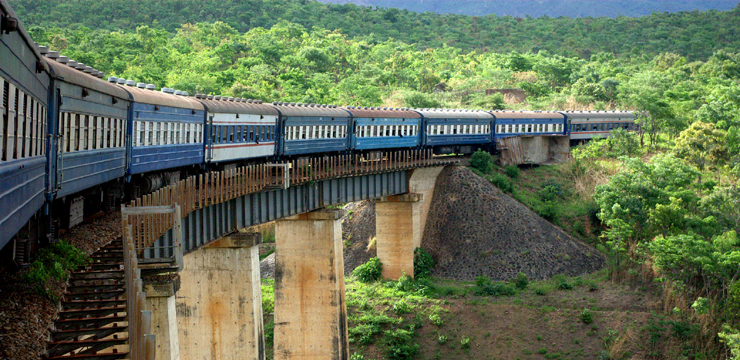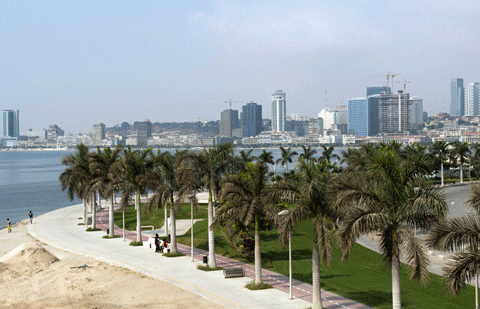Taking stock
Updated: 2014-05-02 09:24
By Li Lianxing in Nairobi (China Daily Africa)
Comments Print Mail Large Medium SmallChina's economy has become closely bonded with Africa's over the past 10 to 15 years, he says. In particular, growth in China over the past decade has been investment-led and resource intensive, which in turn has sucked in commodity imports from a number of countries.
However, amid the worrying figures, investors and bankers continue to voice confidence about economic ties between China and Africa, predicting rapid growth in trade.
Standard Chartered Bank has estimated that the value of trade between China and Africa will exceed $280 billion next year, compared with $210 billion last year.
"The growth in trade between the two sides has been remarkable, but there is still a lot of scope for improvement," says Zhang Xiaolei, chief executive officer of Standard Chartered Bank China.
"Three trends in this bilateral trade will complement one another: trade will expand from raw materials and cheap products to high value-added products and services based on the upgrade of economic value chains on both sides; the rise of Africa's consumer class will make China's trade with and investment in Africa cover more African countries; and the Chinese yuan is expected to be a core currency in Africa for settlement, investment and forex reserves."
Zhang made the comments recently at an investment and financial forum in Beijing for Chinese investors interested in investing in Africa. Lamin Manjang, CEO of Standard Chartered Bank in eastern Africa, says there is great investment potential for China in Africa in areas such as oil, gas, mining, telecommunications and agriculture.
"With agriculture, for example, there is a lot of arable land in Africa where production is highly inefficient. Chinese companies could invest in this to lift productivity. There is also huge demand in Africa for infrastructure construction. Annual investment in that is worth nearly $93 billion, and there are plenty of opportunities for China in that."
As growth in China slows, the strength of the China-Africa relationship is underlined by figures that show bilateral trade was worth $210.2 billion last year, an increase of 5.9 percent on the previous year, the China Chamber of International Commerce says.
Chinese exports to Africa rose 8.8 percent to $92.8 billion, and imports from Africa rose 3.8 percent to $117.4 billion, the chamber says.
More than 2,000 Chinese companies had set up operations in Africa by the end of last year, in areas including agriculture, finance, infrastructure, logistics, manufacturing, resources exploration and trade, the chamber says.
Shah of Capital Economics says the relationship between China and Africa extends beyond the demand for natural resources.
"A number of state-owned companies in China have set up factories in East Africa in particular to take advantage of lower labor costs. Chinese companies are also exporting consumer goods to Africa on a larger scale to tap into Africa's growing consumer market.
"And Africa now is diversified enough to deal with headwinds from other parts of the world including China. Africa came through the 2008-09 global recession relatively well, and the key with China is that, although some countries may slow down, the region as a whole should continue to perform well. Indeed, we expect Chinese demand for oil and consumer goods to hold up relatively strongly. As such, the likes of Angola, which exports oil to China, and Botswana (diamonds) are less vulnerable to a slowdown in China."
In the meantime, there are a number of structural reforms and policies that can be implemented to improve the region's growth prospects, Shah says.
"Firstly, a more diversified export base, with less reliance on China, will help to mitigate some risk. Perhaps most useful would be to increase regional trade links. Indeed, there is evidence of this happening in East Africa, where lower trade tariffs are being negotiated. More generally, structural reform to reduce corruption and bureaucracy and increase infrastructure spending is vital for medium-term prospects."
The latest issue of the World Bank publication Africa's Pulse, a two-year analysis of the continent's economic prospects, predicts that economic growth in sub-Saharan Africa will continue rising, from 4.7 percent last year to 5.2 percent this year, with a fillip from rising investment in natural resources and infrastructure and strong household spending.
More importantly, capital inflows to the region continued to rise last year, 5.3 percent of regional GDP, significantly above the developing-country average of 3.9 percent. Net foreign direct investment grew 16 percent to a near-record $43 billion, boosted by new oil and gas discoveries in many countries including Angola, Mozambique and Tanzania, the Word Bank says.







